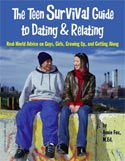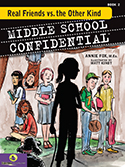Welcome Educators — you don’t need me to tell you that students often bring non-academic issues into class. You see it every day. We’re talking about normal concerns about popularity and peer pressure as well as extraordinary issues they might be dealing with at home.
Understandably, you’ve got a curriculum to teach which may not include tending to your students’ social/emotional challenges. But I’m guessing that if you could help your students be more self-accepting and more respectful of others, that you’d do it. Even if it wasn’t necessarily in your job description.
I’ve been an educator for over 30 years. Let me help you help them. Read this month’s Character Education lesson plan, check out my workshop offerings (for students and teachers), browse through the school-related questions teens and parents have sent me, or email me a question of your own. You can be an important part of your students’ support network. And isn’t that why you became a teacher in the first place?
Lesson #3: How Does Stress Make You Feel?
Activity type: Brainstorm & Discussion
|  |
Here’s How:
- SHARE: Observations from your stress triggers and attempts to get back in balance from the last Real World Challenge.
- INTRO: Everyone has stress responses. Maybe you can’t find something you need. Or a friend teases you. Or you get in a fight with your brother/sister. Or you make a mistake and people laugh. Sometimes your response to one of those situations is no big deal. Other times, you may be totally knocked off-balance. In all cases, stress creates lots of changes very quickly.
- BRAINSTORM: What physical changes do you notice when you’re stressed? NOTE: Make a running list on the board.
PHYSICAL CHANGES: Surge of adrenalin (a stress hormone); increased heart rate; rapid, shallow breathing; loss of appetite. Why does this happen?
SHORT ANSWER: Sensing danger, your brain prepares you to fight or run. A jolt of adrenalin heightens your awareness. - Increased heart rate gets blood pumping so you can be strong and/or run fast. Quick breathing oxygenates blood. All non-essential functions shut down & energy gets re-directed to the heart, etc.
- Digestive system shuts down (stress-induced stomach aches are common).
- Immune system shuts down too. Not fighting infection now. Short-term, no harm. Long-term stress contributes to high blood pressure, ulcers, lowered immunity, etc.
- BRAINSTORM: What changes in your emotions do you notice when you’re stressed?
EMOTIONAL CHANGES are usually in the realm of anger (lashing out) OR withdrawal (shutting down). Fight or flight. - REAL WORLD CHALLENGE: Notice your own physical and emotional symptoms to stress. Try to calm yourself down before you lose control.
















